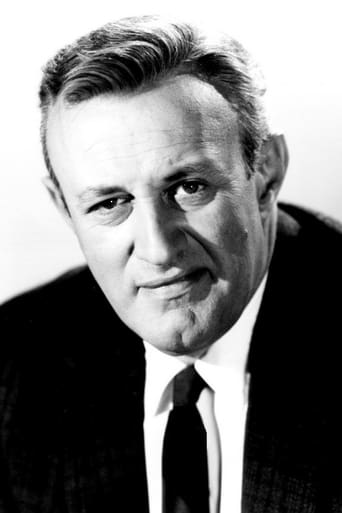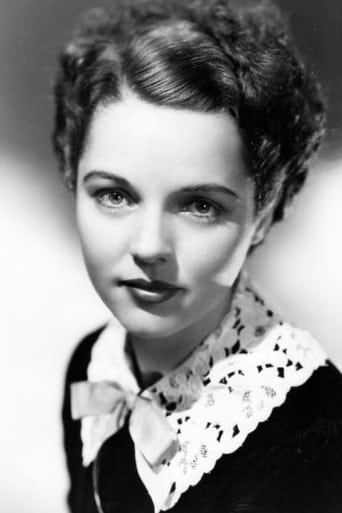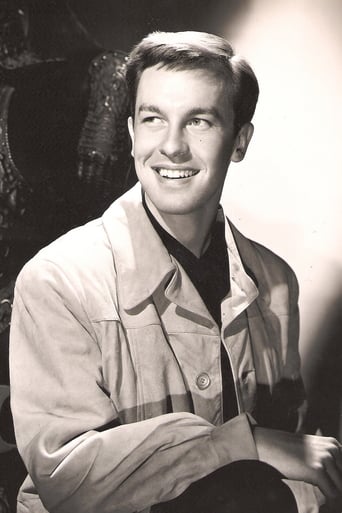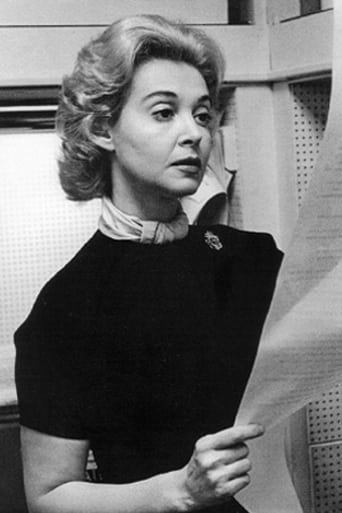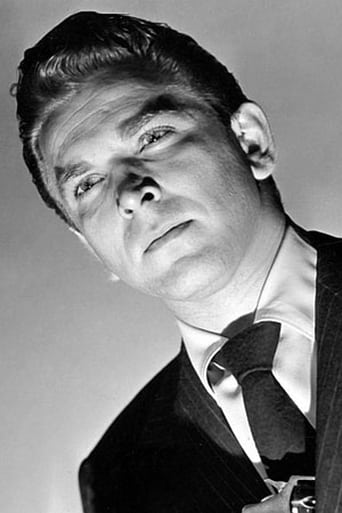Claysaba
Excellent, Without a doubt!!
Dorathen
Better Late Then Never
CrawlerChunky
In truth, there is barely enough story here to make a film.
Edwin
The storyline feels a little thin and moth-eaten in parts but this sequel is plenty of fun.
clanciai
The question that must arise from the beginning,m and which turns this movie doubtful from the start, is how such an experienced and qualified detective as Lee J. Cobb could allow himself to be lead by such a woman to his own bad end? He must realize from the beginning that it must be impossible at length to get away with such a cover up. All the same, it's an interesting intrigue, the plot is formidable as Lee must perform a complicated double play which is bound to constantly get more difficult, but what saves the film is the tremendous finale. Hitchcock must have been inspired by this set-up at Fort Point under the great bridge with its fantastic opportunities for a thriller finale. There are many details adding to an excellent thriller, like her scarf blowing off in the end, the Italian family incident, the great introductory scene with its opening the door to any possible crime that only can be guessed at - and which leads to crime that no one wanted to commit. Lee J. Cobb's foolery is questionable, but the film is great in spite of its foibles and should be worth restoring to its original quality indeed.
kapelusznik18
***SPOLIERS*** Just wanting to cover up the murder, or homicide, of his lover's Lois Frazer, Jane Wyatt, estranged husband Howard, Harlan Warde, SFPD highly decorated and respected Let. Det. Cullen, really screwed thing up for himself thinking that he's in control of the situation. It just happened that his kid brother Andy, John Dall, was put on the murder case, his first, that if solved would implicate Lt.Cullen in Mr. Frazer's death! Doing all all he could, even moving the body, to make it look like Mr. Frazer was killed in a mugging at the San Francisco Airport Brother Andy uncovered a number of clues that pointed straight to big brother Ed in both the murder and cover up.Meanwhile the murder weapon was recovered and showed that it was involved in the murder of a liquor store owner as well which brother Cullen & Mrs. Lois Frazer had nothing to do with. As it turned out after Ed had gotten rid of the gun that killed Mr. Frazer, by throwing it off the Golden Gate Bridge, this hood Nito Capa, Alan Wells, recovered and used in the murder robbery! Now it seem that both Let. Ed Cullen and Lois were home free to get back to their lives without worrying about their involvement, in Lois killing and Cullen covering up, in Mr. Frazer's murder: Or so they thought!***SPOILERS*** With the coast seeming clear for Cullen and his lover Lois brother Andy uncovered a clue that not only exonerated Capa of Frazer's murder but reinforced his suspicion of his big brother as well as Mrs. Frazer's involvement in Mr. Frazer's demise! Knowing that the jig is up and about to be arrested the two lovebirds, Cullen & Mrs. Frazer, made a run for it and ended up hiding at Fort Point at the base of the Golden Gate Bridge. And it's there that the two were soon caught by the police in that's where Andy knew, back when Ed and himself were young boys, was Let. Cullen's favorite hiding place! To add insult to injury at their trial Ed's lover Lois completely ignored him and made a play for her high price lawyer or shyster who by now, in trying to get her off, was far more important to her then Ed was. And poor Ed who just wanted to do, in his love sick mind, the right thing may now well end up spending the rest of his life behind bars for doing it!
mark.waltz
I've heard film historians describe film noir as being about a man destroying himself because of sex. That certainly is the case here where police lieutenant Lee J. Cobb witnesses the society girl (Jane Wyatt) he's in love with frantically kill her husband whom she believes is about to try and kill her. Rather than arrest her, he aids and abets her, which creates suspicion with his younger cop brother (John Dall). Younger brother quickly begins to suspect the truth, and in trying to cover up his protection of Wyatt, Cobb inadvertently destroys himself in the process.It is entirely obvious what is going to transpire here, but it is so much fun watching all the pieces fall into place. It is also interesting to see "Father Knows Best" mother Jane Wyatt play a not-so-nice character, a far cry from the majority of the film heroines she played, dating back to the original "Lost Horizon". Cobb certainly wins sympathy for what he does to protect the woman he loves (who most certainly would end up betraying him if she had the chance) and his performance is excellent. This is one of those little "sleeper" films that deserves re-discovering for a crafty screenplay and the little details that are sometimes looked over yet end up being pivotal when included. Here, that comes with each and every character, even the minor ones, including Dall's fiancée, Lisa Howard, an airport security guard, and several witnesses.
Robert J. Maxwell
A homicide lieutenant, Lee J. Cobb, has a rich girl friend, Jane Wyatt, who is about to divorce her husband. The husband has been planning to kill her and make it look like a burglary gone wrong. Cobb stumbles into their sitting room just as Wyatt and her husband are struggling for the gun. Hubby winds up shot twice and dead. Instead of reporting the incident to the police, Cobb disposes of the body elsewhere and throws the gun off the Golden Gate Bridge.He's assigned to the case, however, and is to be assisted by his younger brother, John Dall, a rookie sergeant. All kinds of twists and turns follow. The gun thrown from the bridge evidently landed in the net of a fishing boat instead of the sea. And another gun is used in a robbery that is microscopically identical to the gun in Cobb's case. A witness to Cobb's disposal of the body turns out to have been color blind and made a mistake concerning the color of the coupe Cobb was driving.John Dall finally twigs. Cobb cold cocks him and he and Wyatt leave for a temporary hiding place at Fort Point, but Dall discovers them and they are arrested. Final scene: A charming Wyatt is cuddling her lawyer in the courthouse, saying, "Oh, you'll get me out of this, won't you? I have lots of money." After a contemptuous stare, she passes the handcuffed Cobb without a word.It's a workably formulaic plot -- investigating yourself, or having your brother investigate you. "The Big Clock" probably did a better job of it. More recently it was borrowed for "Presumed Innocent." I don't know how many other examples have been floating around.This exemplar is pretty humdrum. Lee J. Cobb is a magnificent actor and has done fine work elsewhere, especially for Elia Kazan. Here, he's dour throughout. Even at the beginning, when he's supposed to be joking with his newly arrived kid brother about the kid's forthcoming marriage, he seems to be performing a duty instead of enjoying himself. Nor is this Jane Wyatt's kind of role -- the treacherous, perfidious rich dame. She was attractive and perceptive and sensible. Here, the director (Felix Feist) has her overacting to the point of dolor. (She faints twice in the same scene after some hysterical babbling.) Dall doesn't add much but he's given at least a more complex role.The story itself doesn't make a heck of a lot of sense. After all, Jane Wyman had been whining abjectly about her husband's plans to murder her -- and she was RIGHT. Hubby had jimmied the door, bought a gun, and did what he could to arrange a fake burglary and was caught and killed just in time to prevent him from achieving his goal. So why does an experienced policeman like Cobb, without a moment's reflection, decide to cover up the death? How can two guns have identical lans and grooves? And what is the likelihood of their BOTH being used in murders within a few days of each other? I'll tell you what the likelihood of that's happening is. The probability is exactly .00012848329.Come to think of it, I'm not sure about how one of those guns wound up in Tito Vuolo's fishing net. Was it the gun that Cobb threw from the bridge? Or did the gun belong to Vuolo's ne'er-do-well son? And, if I remember, blue-green color blindness is less common than red-green. Not that it makes much difference in everyday life. I mean, when was the last time anything important depended on your distinguishing blue from green? The Samoan language has only one word for the part of the color spectrum that includes both blue and green and the Samoan people are doing quite well, thank you very much.I've kind of made fun of an unambitious B feature, I know, and maybe I shouldn't, but it really is a little dull and sometimes jarringly discordant.


